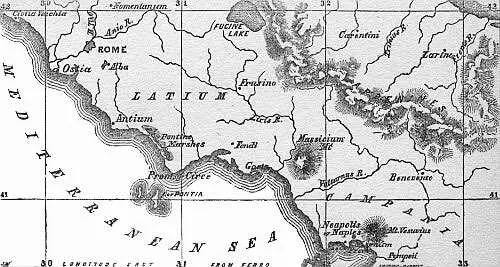Jacob Abbott - Nero
Здесь есть возможность читать онлайн «Jacob Abbott - Nero» — ознакомительный отрывок электронной книги совершенно бесплатно, а после прочтения отрывка купить полную версию. В некоторых случаях можно слушать аудио, скачать через торрент в формате fb2 и присутствует краткое содержание. ISBN: , Жанр: foreign_antique, foreign_prose, Историческая проза, на английском языке. Описание произведения, (предисловие) а так же отзывы посетителей доступны на портале библиотеки ЛибКат.
- Название:Nero
- Автор:
- Жанр:
- Год:неизвестен
- ISBN:http://www.gutenberg.org/ebooks/27312
- Рейтинг книги:4 / 5. Голосов: 1
-
Избранное:Добавить в избранное
- Отзывы:
-
Ваша оценка:
- 80
- 1
- 2
- 3
- 4
- 5
Nero: краткое содержание, описание и аннотация
Предлагаем к чтению аннотацию, описание, краткое содержание или предисловие (зависит от того, что написал сам автор книги «Nero»). Если вы не нашли необходимую информацию о книге — напишите в комментариях, мы постараемся отыскать её.
Nero — читать онлайн ознакомительный отрывок
Ниже представлен текст книги, разбитый по страницам. Система сохранения места последней прочитанной страницы, позволяет с удобством читать онлайн бесплатно книгу «Nero», без необходимости каждый раз заново искать на чём Вы остановились. Поставьте закладку, и сможете в любой момент перейти на страницу, на которой закончили чтение.
Интервал:
Закладка:
Jacob Abbott
Nero / Makers of History Series

Environs of Rome.
PREFACE
In writing the series of historical narratives to which the present work pertains, it has been the object of the author to furnish to the reading community of this country an accurate and faithful account of the lives and actions of the several personages that are made successively the subjects of the volumes, following precisely the story which has come down to us from ancient times. The writer has spared no pains to gain access in all cases to the original sources of information, and has confined himself strictly to them. The reader may, therefore, feel assured in perusing any one of these works, that the interest of it is in no degree indebted to the invention of the author. No incident, however trivial, is ever added to the original account, nor are any words even, in any case, attributed to a speaker without express authority. Whatever of interest, therefore, these stories may possess, is due solely to the facts themselves which are recorded in them, and to their being brought together in a plain, simple, and connected narrative.
Chapter I
Nero's Mother
A.D. 37
Roman country seats.
In ancient times, when the city of Rome was at the height of its power and splendor, it was the custom, as it is in fact now with the inhabitants of wealthy capitals, for the principal families to possess, in addition to their city residences, rural villas for summer retreats, which they built in picturesque situations, at a little distance from the city, sometimes in the interior of the country, and sometimes upon the sea-shore. There were many attractive places of resort of this nature in the neighborhood of Rome. Among them was Antium.
Antium.
Situation of the promontory of Antium.
Antium was situated on the sea-coast about thirty miles south of the Tiber. A bold promontory here projects into the sea, affording from its declivities the most extended and magnificent views on every side. On the north, looking from the promontory of Antium, the eye follows the line of the coast away to the mouth of the Tiber; while, on the south, the view is terminated, at about the same distance, by the promontory of Circe, which is the second cape, or promontory, that marks the shore of Italy in going southward from Rome. Toward the interior, from Antium, there extends a broad and beautiful plain, bounded by wooded hills toward the shore, and by ranges of mountains in the distance beyond. On the southern side of the cape, and sheltered by it, was a small harbor where vessels from all the neighboring seas had been accustomed to bring in their cargoes, or to seek shelter in storms, from time immemorial. In fact, Antium, in point of antiquity, takes precedence, probably, even of Rome.
The beauty and the salubrity of Antium made it a very attractive place of summer resort for the people of Rome; and in process of time, when the city attained to an advanced stage of opulence and luxury, the Roman noblemen built villas there, choosing situations, in some instances, upon the natural terraces and esplanades of the promontory, which looked off over the sea, and in others cool and secluded retreats in the valleys, on the land. It was in one of these villas that Nero was born.
Account of Nero's parentage.
Brazenbeard.
Nero's father belonged to a family which had enjoyed for several generations a considerable degree of distinction among the Roman nobility, though known by a somewhat whimsical name. The family name was Brazenbeard, or, to speak more exactly, it was Ahenobarbus, which is the Latin equivalent for that word. It is a question somewhat difficult to decide, whether in speaking of Nero's father at the present time, and in the English tongue, we should make use of the actual Latin name, or translate the word and employ the English representative of it; that is, whether we shall call him Ahenobarbus or Brazenbeard. The former seems to be more in harmony with our ideas of the dignity of Roman history; while the latter, though less elegant, conveys probably to our minds a more exact idea of the import and expression of the name as it sounded in the ears of the Roman community. The name certainly was not an attractive one, though the family had contrived to dignify it some degree by assigning to it a preternatural origin. There was a tradition that in ancient times a prophet appeared to one of the ancestors of the line, and after foretelling certain extraordinary events which were to occur at some future period, stroked down the beard of his auditor with his hand, and changed it to the color of brass, in miraculous attestation of the divine authority of the message. The man received the name of Brazenbeard in consequence, and he and his descendants ever afterward retained it.
Nero's father.
Agrippina his mother.
The family of the Brazenbeards was one of high rank and distinction, though at the time of Nero's birth it was, like most of the other prominent Roman families, extremely profligate and corrupt. Nero's father, especially, was a very bad man. He was accused of the very worst of crimes, and he led a life of constant remorse and terror. His wife, Agrippina, Nero's mother, was as wicked as he; and it is said that when the messenger came to him to announce the birth of his child, the hero of this narrative, he uttered some exclamation of ill-humor and contempt, and said that whatever came from him and Agrippina could not but be fraught with ruin to Rome.
Agrippina's brother Caligula.
Roman emperors.
The rank and station of Agrippina in Roman society was even higher than that of her husband. She was the sister of the emperor. The name of the emperor, her brother, was Caligula. He was the third in the series of Roman emperors, Augustus Cæsar, the successor of Julius Cæsar, having been the first. The term emperor, however, had a very different meaning in those days, from its present import. It seems to denote now a sovereign ruler, who exercises officially a general jurisdiction which extends over the whole government of the state. In the days of the Romans it included, in theory at least, only military command. The word was imperator , which meant commander ; and the station which it denoted was simply that of general-in-chief over the military forces of the republic.
Regulations in respect to the Roman armies.
In the early periods of the Roman history, every possible precaution was taken to keep the military power in a condition of very strict subordination to the authority of the civil magistrate and of law. Very stringent regulations were adopted to secure this end. No portion of the army, except such small detachments as were required for preserving order within the walls, was allowed to approach the city. Great commanders, in returning from their victorious campaigns, were obliged to halt and encamp at some distance from the gates, and there await the orders of the Roman Senate. The Senate was, in theory, the great repository of political power. This Senate was not, however, as the word might seem in modern times to denote, a well-defined and compact body of legislators, designated individually to the office, but rather a class of hereditary nobles, very numerous, and deriving their power from immemorial usage, and from that strange and unaccountable feeling of deference and awe with which the mass of mankind always look up to an established, and especially an ancient, aristocracy. The Senate were accustomed to convene at stated times, in assemblages which were, sometimes, conducted with a proper degree of formality and order, and sometimes on the other hand, exhibited scenes of great tumult and confusion. Their power, however, whether regularly or irregularly exercised, was supreme. They issued edicts, they enacted laws, they allotted provinces, they made peace, and they declared war. The armies, and the generals who commanded them, were the agents employed to do their bidding.
Читать дальшеИнтервал:
Закладка:
Похожие книги на «Nero»
Представляем Вашему вниманию похожие книги на «Nero» списком для выбора. Мы отобрали схожую по названию и смыслу литературу в надежде предоставить читателям больше вариантов отыскать новые, интересные, ещё непрочитанные произведения.
Обсуждение, отзывы о книге «Nero» и просто собственные мнения читателей. Оставьте ваши комментарии, напишите, что Вы думаете о произведении, его смысле или главных героях. Укажите что конкретно понравилось, а что нет, и почему Вы так считаете.












